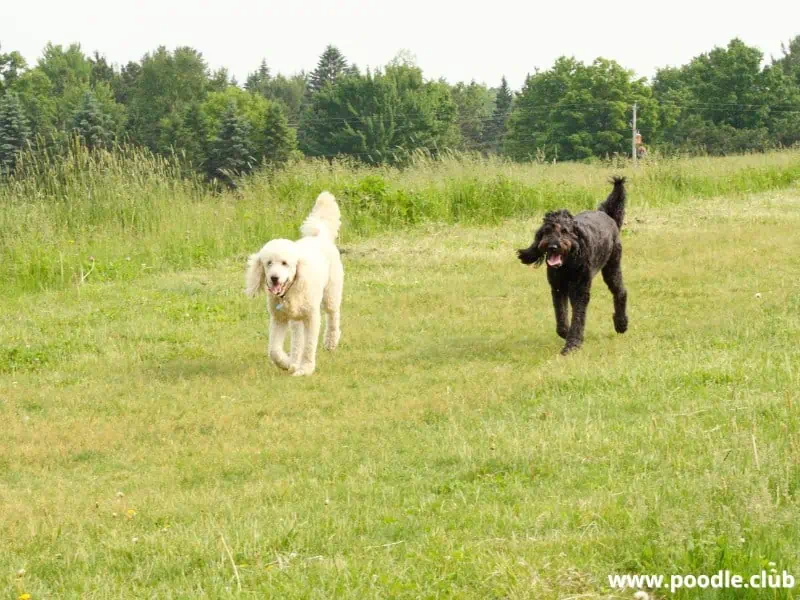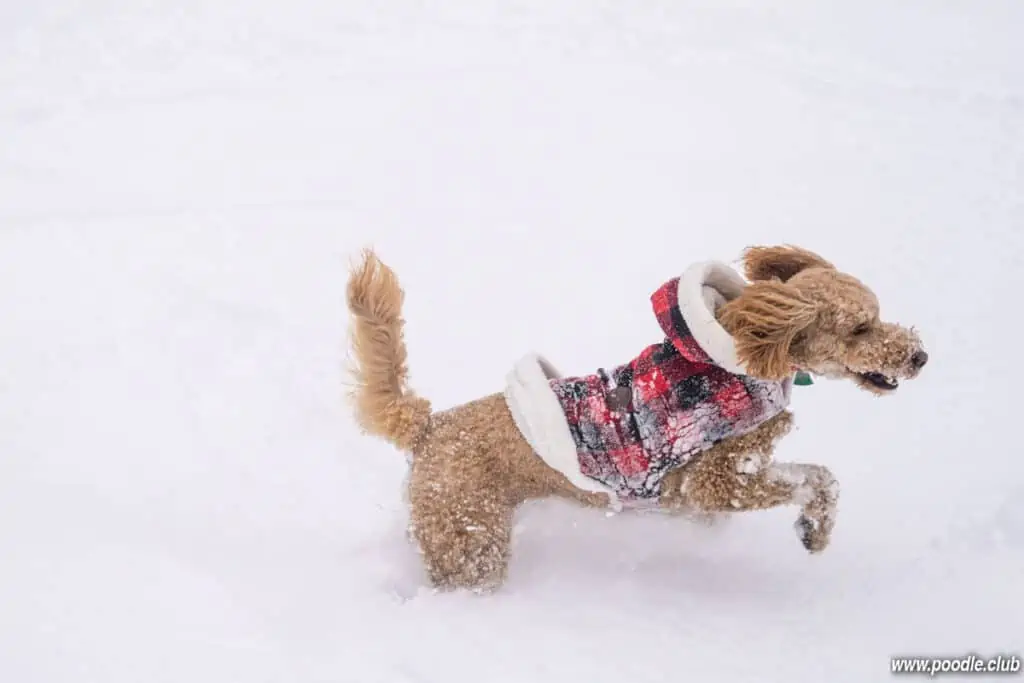Do Labradoodles Like to Hunt? Exploring Their Instincts
Labradoodles, a crossbreed between the Labrador Retriever and the Poodle, have gained immense popularity due to their friendly personalities and hypoallergenic coats. Their lineage includes two breeds – Labradors known for their hunting abilities and Poodles, which were initially bred for water retrieval.
This combination raises the question: Do Labradoodles like to hunt?

As a designer breed, Labradoodles inherit traits from both parent breeds. While not all Labradoodles possess the same aptitude for hunting, some certainly demonstrate a natural affinity for it. The hunting inclination of a Labradoodle can vary depending on the individual dog and its inherited traits, as well as the training it receives.
It’s important to note that Labradoodles are not solely hunting dogs and make excellent family pets, as well. However, if you’re interested in exploring your Labradoodle’s potential as a hunting companion, it’s essential to consider the breed’s behavior, physical abilities, and training requirements.
Key Takeaways
- Labradoodles may inherit hunting abilities from their Labrador Retriever and Poodle parent breeds
- A Labradoodle’s inclination to hunt can vary based on individual traits and training
- Labradoodles are versatile and can serve as both hunting companions and family pets
Understanding Labradoodle Breeds
When considering a Labradoodle’s hunting instincts, it is important to understand their breed background. Labradoodles are a crossbreed between a Labrador Retriever and a Standard Poodle, combining the best traits of both breeds. They were initially bred as a hypoallergenic designer dog, ideal for people with allergies.

Labrador Retriever is a highly popular breed known for its hunting abilities, retrieving game, and water-based skills. On the contrary, the Standard Poodle is known for its intelligence, agility, and hypoallergenic coat. Sometimes, the Australian Labradoodle, a multi-generation breed, may be part of the mix, adding further diversity to the dog’s lineage.
This blend of characteristics offers a unique combination of skills, looks, and coat types found in Labradoodles today.
Labradoodles come in various sizes, ranging from miniature to standard. The size and overall appearance of your Labradoodle depend on their specific pedigree and the traits inherited from their parents. Determining a Labradoodle’s potential hunting abilities can depend on these inherited traits.
When it comes to coat type, Labradoodles have three main options: fleece, wool, or hair. The fleece and wool types are considered hypoallergenic, while the hair coat more closely resembles that of a Labrador Retriever. Each coat type requires different care and grooming, which can impact your decision to include hunting in your Labradoodle’s activities.
In conclusion, understanding the specific breed background, size, coat type, and inherited traits of your Labradoodle can play a significant role in their hunting abilities. By thoroughly examining these factors, you will be better prepared to determine if your Labradoodle is well-suited for hunting activities.
Labradoodles as Hunting Dogs
When considering a hunting dog, you may be curious about the abilities of a Labradoodle. These dogs are a cross between the Labrador Retriever and the Poodle, both of which have been used as gun dogs. Due to their genetic lineage, Labradoodles have the potential to excel in the field as hunting companions.

Labradoodles possess a moderate prey drive and can be trained in retrieving and tracking. However, not every Labradoodle is perfectly suited for duck hunting or other hunting activities. Factors such as temperament, physical traits, and training will impact their effectiveness in the field.
PuppySpot is a reputable dog marketplace where you can browse and find compatible puppies right from the comfort of your home. They have placed over 200,000 puppies into homes in the US!
As water retrievers, these dogs inherit natural swimming abilities from their parent breeds. Their double coat is generally water-resistant, allowing them to retrieve downed waterfowl in various conditions. Regularly exposing your Labradoodle to water during training will help them become comfortable with it and improve their abilities as water retrievers.
To mold your Labradoodle into a reliable hunting companion, participating in retriever hunting tests and field trials will provide valuable experience and feedback on their performance. These structured events will allow you to observe your dog’s natural instincts, such as tracking and retrieving, and provide a framework for reinforcing desirable behaviors.
In conclusion, while Labradoodles have the potential to be excellent hunting dogs, it is important to remember that each dog is an individual with unique abilities, traits, and personalities. By dedicating time and effort to training and evaluating your Labradoodle’s aptitude for hunting, you can determine if they are the ideal fit for your hunting needs.
Behavioral Traits and Training for Hunting
Labradoodles are known for their intelligence and eagerness to please their owners. These traits make them highly trainable and adaptable. When it comes to hunting, their keenness to learn and obey commands can be beneficial.

To tap into your Labradoodle’s potential for hunting, start with basic obedience training, focusing on commands that are essential for hunting activities. The dog’s energy and stamina will need to be utilized effectively, ensuring they receive enough exercise and mental stimulation. Incorporate puzzle toys and activities to engage their minds and keep them sharp.
Training for hunting requires consistency and patience. As a Labradoodle owner, you should be prepared to invest time in building a strong foundation of trust and loyalty with your dog. This bond will help improve your hunting experiences together.
Dedicate time to practice and reinforce hunting-related tasks, such as retrieving and scent work.
Keep in mind that Labradoodles are a high-energy breed. They require sufficient mental and physical exercise to stay content and well-behaved. Ensure your dog’s daily routine includes activities that challenge their body and mind to maintain optimal energy levels and focus during hunting sessions.
In summary, Labradoodles can be trained for hunting, given their intelligence, eagerness to please, and stamina. Providing consistent obedience training, mental stimulation, and exercise will help you and your Labradoodle enjoy successful hunting experiences together. Remember to be patient and foster a loyal bond with your dog, as this will create a strong foundation for a successful hunting partnership.
Physical Requirements in Hunting Labradoodles
As a hunting companion, Labradoodles possess many traits that make them suitable for the role. Their physical capabilities help in navigating diverse terrains, including water, and endure long hours outdoors.

Labradoodles are comfortable in the water and enjoy swimming. Their fur is water-resistant, which prevents them from getting weighed down by water during a hunt. Although they have low-shedding coats, regular grooming is essential to maintain their coat’s functionality and cleanliness.
Webbed paws allow these dogs to swim with ease and increase their speed and efficiency in the water. Remember to check and clean your dog’s paws after hunts to keep them in good condition. On land, Labradoodles display impressive speed and endurance, making them a valuable asset when chasing down prey over long distances.
Being in the outdoors and engaging in physical activity is good for your Labradoodle’s health and wellbeing. This breed is naturally athletic and requires regular exercise to maintain their energy levels and overall fitness. Whether you’re hunting or simply training for the experience, it’s important to give your Labradoodle an opportunity to explore their instincts and athletic capabilities.
In conclusion, considering their physical requirements, Labradoodles can be a reliable hunting partner. By staying mindful of their swimming, shedding, webbed paws, speed, endurance, and love for the outdoors, you can ensure that your Labradoodle thrives in a hunting environment.
Selecting a Labradoodle for Hunting
When choosing a Labradoodle for hunting, start by finding reputable breeders who specialize in breeding Labradoodle puppies for hunting purposes. These breeders understand the traits and qualities needed to produce strong retrievers with a natural-born hunting instinct. It is essential to work with breeders who have experience with Labradoodles as hunting dogs and can guide you in selecting the ideal hunting companion.

In your search for a Labradoodle with strong retrieving instincts and potential, take into account the backgrounds of both the Poodle and Labrador Retriever. These retrieving breeds have a strong foundation in the hunting world, making Labradoodles excellent candidates for hunting dogs. Inquire about the parents of your potential puppy to ensure they possess the desired hunting traits.
When evaluating Labradoodle puppies, look for certain characteristics that indicate a strong hunting instinct. Observe their behavior and interaction with their littermates and surroundings. Look for puppies that are confident, show interest in retrieving objects, and have a keen sense of smell.
Labradoodles with a strong retrieving instinct will often display these traits early on in their development.
To train your Labradoodle for hunting, begin their training at a young age. Work on basic obedience skills like “sit,” “stay,” and “come” to establish a strong foundation. Introduce retrieving exercises using dummies or other objects that simulate game.
Gradually progress to more advanced exercises to develop their natural hunting abilities.
Keep in mind that Labradoodles are not exclusively hunting dogs, but their background as retrievers still makes them one of the best hunting dogs for certain types of game. Your Labradoodle’s success as a hunting dog will largely depend on their genetics, early training, and your dedication to their development.
Labradoodles as Family Pets
Labradoodles make excellent family pets due to their friendly and sociable nature. They have a delightful personality that endears them to adults and children alike. Their gentle temperament, coupled with intelligence and affection, makes them ideal for various roles, including service dog and guide dog work.

Like Goldendoodles, Labradoodles are known for their minimal shedding, making them suitable for families with allergy concerns. Regular grooming and maintenance help keep their coats clean and tangle-free. In terms of health, Labradoodles can be prone to certain hereditary issues like hip dysplasia, but regular check-ups and maintaining a healthy weight can help reduce the risk of these problems.
It’s essential to work with a reputable breeder who conducts health tests on breeding dogs.
While Labradoodles can develop strong bonds with their families, they are not generally considered guard dogs. Rather, their sociable disposition makes them more likely to greet visitors with warmth and excitement. However, they can still be protective of their loved ones when needed.
When considering a Labradoodle as a family pet, keep in mind the importance of providing proper training and socialization to ensure they grow into well-rounded, confident companions. By engaging in positive reinforcement techniques, you can foster a strong bond with your Labradoodle and ensure their success as a beloved family member.


![What is the Temperament of a Poodle? [Personality]](https://poodle.club/wp-content/uploads/2022/12/what-is-the-temperament-of-a-poodle-768x512.webp)
![Fat Poodle [Poodle Obesity Guide]](https://poodle.club/wp-content/uploads/2022/12/fat-poodle-obesity-768x512.webp)


![How To Clean Poodle Ears? [DIY Guide]](https://poodle.club/wp-content/uploads/2022/08/how-to-clean-poodle-ears-768x512.webp)
